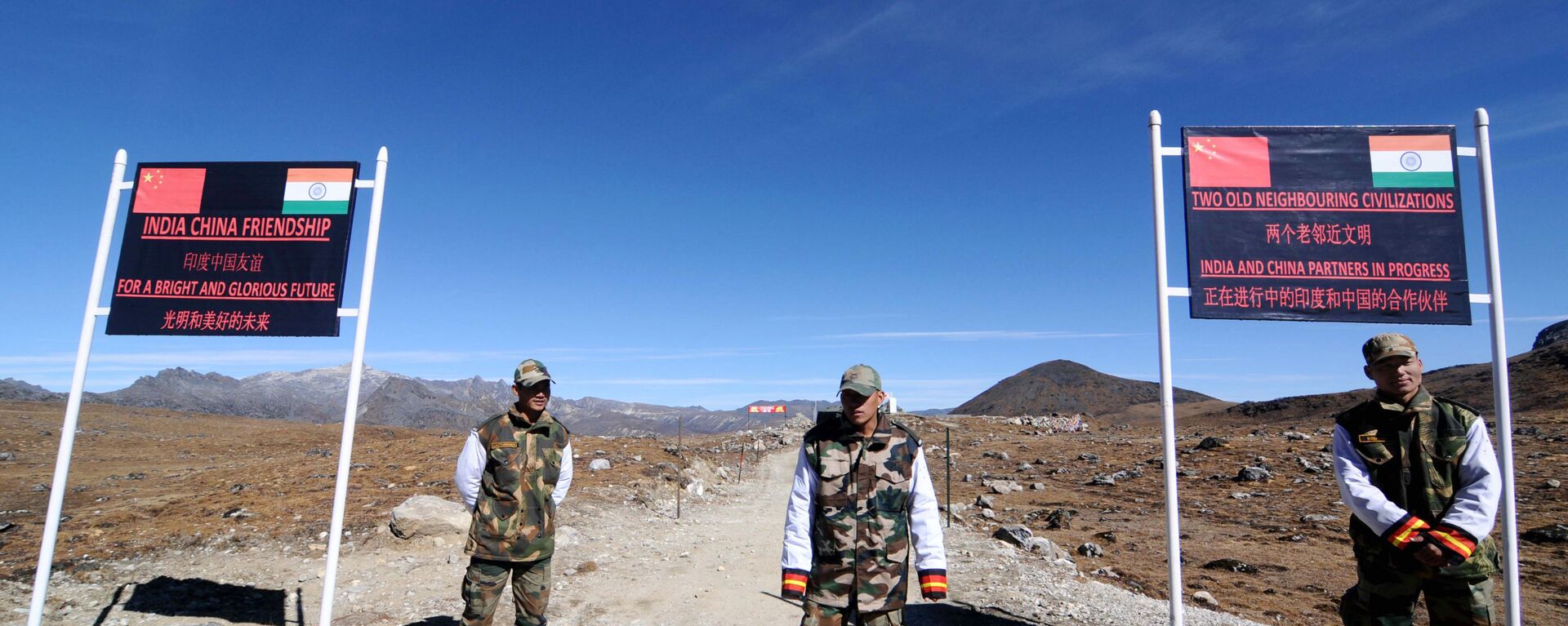https://sputnikglobe.com/20211026/chinas-new-border-law-mandates-pla-to-build-dual-use-infrastructure-on-its-borders-expert-says-1090195265.html
China's New Border Law Mandates PLA to Build Dual Use Infrastructure on Its Borders, Expert Says
China's New Border Law Mandates PLA to Build Dual Use Infrastructure on Its Borders, Expert Says
Sputnik International
China's legislature passed a new border law on Saturday that empowers the state and military to take the necessary steps to safeguard territory and "combat any... 26.10.2021, Sputnik International
2021-10-26T12:17+0000
2021-10-26T12:17+0000
2024-01-05T15:13+0000
bhutan
pla
china
indian army
people's liberation army (pla) navy
border
https://cdn1.img.sputnikglobe.com/img/103426/12/1034261288_0:161:3071:1888_1920x0_80_0_0_86fd5f4125f10b832d35d34a0f4c9908.jpg
The decision was made by the Standing Committee of the National People's Congress of the People's Republic of China at the 31st session of the 13th National People's Congress of China on Saturday, the Xinhua News Agency has reported. Xinhua said that the legislature "voted to adopt a new law on the protection and exploitation of the country's land border areas".The law "stipulates that the sovereignty and territorial integrity of the People's Republic of China are sacred and inviolable". It further stated that "the state shall take measures to safeguard territorial integrity and land boundaries and guard against and combat any act that undermines territorial sovereignty and land boundaries".The legislation calls on the state to "take measures to strengthen border defence, support economic and social development as well as opening-up in border areas, improve public services and infrastructure in such areas, encourage and support people's life and work there".Sputnik has spoken with Rahul Bhonsle, a strategic analyst and ex-Brigadier of the Indian Army, who shared his thoughts on the possible impact of the law on China's neighbours. Sputnik: We have seen reports claiming China has been establishing villages near the Line of Actual Control. How will the new law bring about changes along the border with India?Rahul Bhonsle: China was establishing villages on the Line of Actual Control (LAC) even before the making of this law. China established several villages near the eastern sector of LAC. Now that the law has been passed by the Standing Committee of the National People's Congress (NPC), there is a legal sanctity to this development, implying that resources for strengthening the socio-economic and defence construct can be allocated.Sputnik: Indian authorities have urged people not to vacate villages near the LAC while China is populating remote areas. Is the new law a warning to India as people in Ladakh have complained about losing grazing areas to China?Rahul Bhonsle: China's encroachment through graziers is a very serious security challenge. China has, over a period, sent across the graziers in so-called disputed areas in the form of initial forays for claiming later. India has recently provided infrastructure support to civilians on the border, including mobile communications, and it is expected that this will build confidence, and more people will be willing to settle on the borders.Sputnik: Will this new law also impact other neigbouring countries, and how? What will be the impact of China's bilateral ties with these countries? Rahul Bhonsle: The law provides the People's Liberation Army and the local Chinese government a mandate to build up dual infrastructure on the boundary with all its neighbours. This is a form of intimidation to all neighbours with whom China has a common boundary. How these states react remains to be seen.Sputnik: Will establishing more border infrastructure along the LAC be the first step toward a permanent solution to border issues with India? Rahul Bhonsle: Border infrastructure and the boundary will have to be seen differently. Border villages in many areas are in depth and not necessarily on the front line, thus this does not in any way denote China's acceptance of the boundary with India, and this should not be seen as the creation of a fait accompli.
https://sputnikglobe.com/20211011/blame-game-erupts-as-india-china-fail-to-make-headway-in-military-talks-to-cool-border-tensions-1089824708.html
bhutan
china
Sputnik International
feedback@sputniknews.com
+74956456601
MIA „Rossiya Segodnya“
2021
Rishikesh Kumar
https://cdn1.img.sputnikglobe.com/img/07e4/08/04/1080055820_0:0:388:389_100x100_80_0_0_40018ee210946d65d49ffba4f4c008e1.jpg
Rishikesh Kumar
https://cdn1.img.sputnikglobe.com/img/07e4/08/04/1080055820_0:0:388:389_100x100_80_0_0_40018ee210946d65d49ffba4f4c008e1.jpg
News
en_EN
Sputnik International
feedback@sputniknews.com
+74956456601
MIA „Rossiya Segodnya“
Sputnik International
feedback@sputniknews.com
+74956456601
MIA „Rossiya Segodnya“
Rishikesh Kumar
https://cdn1.img.sputnikglobe.com/img/07e4/08/04/1080055820_0:0:388:389_100x100_80_0_0_40018ee210946d65d49ffba4f4c008e1.jpg
bhutan, pla, china, indian army, people's liberation army (pla) navy, border
bhutan, pla, china, indian army, people's liberation army (pla) navy, border
China's New Border Law Mandates PLA to Build Dual Use Infrastructure on Its Borders, Expert Says
12:17 GMT 26.10.2021 (Updated: 15:13 GMT 05.01.2024) China's legislature passed a new border law on Saturday that empowers the state and military to take the necessary steps to safeguard territory and "combat any acts" that undermine China's territorial claims. The new border law will come into force on 1 January 2022.
The decision was made by the Standing Committee of the National People's Congress of the People's Republic of China at the 31st session of the 13th National People's Congress of China on Saturday, the Xinhua News Agency has reported.
The law "stipulates that the sovereignty and territorial integrity of the People's Republic of China are sacred and inviolable". It further stated that "the state shall take measures to safeguard territorial integrity and land boundaries and guard against and combat any act that undermines territorial sovereignty and land boundaries".
The legislation calls on the state to "take measures to strengthen border defence, support economic and social development as well as opening-up in border areas, improve public services and infrastructure in such areas, encourage and support people's life and work there".
Sputnik has spoken with Rahul Bhonsle, a strategic analyst and ex-Brigadier of the Indian Army, who shared his thoughts on the possible impact of the law on China's neighbours.
Sputnik: We have seen reports claiming China has been establishing villages near the Line of Actual Control. How will the new law bring about changes along the border with India?
Rahul Bhonsle: China was establishing villages on the Line of Actual Control (LAC) even before the making of this law. China established several villages near the eastern sector of LAC. Now that the law has been passed by the Standing Committee of the National People's Congress (NPC), there is a legal sanctity to this development, implying that resources for strengthening the socio-economic and defence construct can be allocated.
Sputnik: Indian authorities have urged people not to vacate villages near the LAC while China is populating remote areas. Is the new law a warning to India as people in Ladakh have complained about losing grazing areas to China?
Rahul Bhonsle: China's encroachment through graziers is a very serious security challenge. China has, over a period, sent across the graziers in so-called disputed areas in the form of initial forays for claiming later. India has recently provided infrastructure support to civilians on the border, including mobile communications, and it is expected that this will build confidence, and more people will be willing to settle on the borders.
Sputnik: Will this new law also impact other neigbouring countries, and how? What will be the impact of China's bilateral ties with these countries?
Rahul Bhonsle: The law provides the
People's Liberation Army and the local Chinese government a mandate to build up dual infrastructure on the boundary with all its neighbours. This is a form of intimidation to all neighbours with whom China has a common boundary. How these states react remains to be seen.

11 October 2021, 08:59 GMT
Sputnik: Will establishing more border infrastructure along the LAC be the first step toward a permanent solution to border issues with India?
Rahul Bhonsle: Border infrastructure and the boundary will have to be seen differently. Border villages in many areas are in depth and not necessarily on the front line, thus this does not in any way denote China's acceptance of the boundary with India, and this should not be seen as the creation of a fait accompli.



